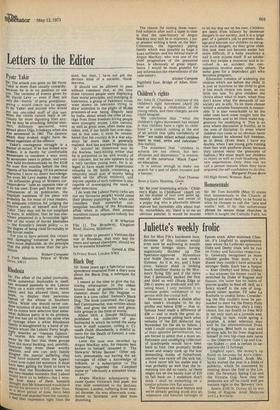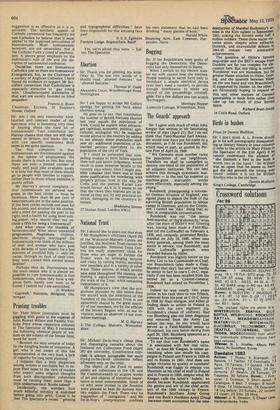Homosexuals
Sir: Mr Tom Sutcliffe (May 5) states that homosexuals in the Church of England are most likely to be found in what he chooses to call the ' lace and smells' belt. If by this unfortunate phrase he means those churches in which is taught the Catholic Faith, his suggestion is as offensive as it is inaccurate. The aesthetic appeal of Catholic ceremonial has frequently led non-Catholics to believe that it must appeal to the supposed sensualness of homosexuals. Most homosexuals, however, are not sensualists. Nor is the Catholic Faith a creed of aestheticism: it places great emphasis on the individual's rule of life and the discipline of sacramental confession.
Doubtless there are homosexual Catholics just as there are homosexual Evangelicals, but, as the Chairman of a society of Anglican Catholics, I have found no evidence to support Mr Sutcliffe's contention that Catholicism is especially attractive to ' gay young men.' Unsubstantiated statements of that sort are usually founded on blind prejudice.
Francis A. Bown Chairman, Ecclesia, St Stephen's House, Oxford Sir: Am 1 the only reasonably kindhearted and tolerant reader of the Spectator who is becoming very tired of hearing about the hard lot of homosexuals? Your contributor Ian . Harvey claims that they are still oppressed in Britain, and backs this up with two specific complaints. Both seem to me quite spurious.
The first complaint is that homosexuals are discriminated against in the sphere of employment. No doubt there is truth in this. But since there are only a limited number of really well paid jobs available, surely it is only fair that most of them should go to people with families to support, rather than to those whose ambition is purely selfish. Mr Harvey's second complaint — that homosexuals are persona non grata in the best circles — must be facetious. More than 99 per cent of heterosexuals are in the same position. If the best circles exclude one man for his accent, and another for his clothes, and a third for passing the port to his right, and a fourth for using lined writing-paper, why should they nc,t exclude a fifth for being a homosexual?
And what about the troubles of heterosexuals? What about unwanted pregnancies, illegitimate children, abortions, shotgun marriages? Do homosexuals ever think of the millions of men and women who have paid with decades of quiet misery for a few minutes of youthful folly — only because, through no fault of their own, they were cursed with normal sexual desires?
Perhaps they do. Psychiatrists say the main reason why it is almost impossible to cure homosexuality is that homosexuals, unless they have a religious faith, hardly ever want to be cured. I cannot say I am astonished.
D. Wathins Gaycroft,' Haleston, Bridgend, Glamorgan



































 Previous page
Previous page